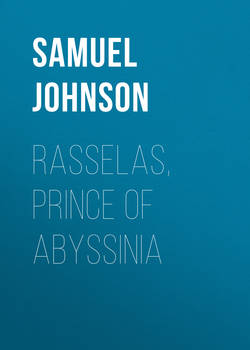Читать книгу Rasselas, Prince of Abyssinia - Samuel Johnson - Страница 1
INTRODUCTION
ОглавлениеRasselas was written by Samuel Johnson in the year 1759, when his age was fifty. He had written his London in 1738; his Vanity of Human Wishes in 1740; his Rambler between March, 1750, and March, 1752. In 1755 his Dictionary had appeared, and Dublin, by giving him its honorary LL.D., had enabled his friends to call him “Doctor” Johnson. His friends were many, and his honour among men was great. He owed them to his union of intellectual power with unflinching probity. But he had worked hard, battling against the wolf without, and the black dog within—poverty and hypochondria. He was still poor, though his personal wants did not exceed a hundred pounds a year. His wife had been seven years dead, and he missed her sorely. His old mother, who lived to the age of ninety, died poor in January of this year, 1759. In her old age, Johnson had sought to help her from his earnings. At her death there were some little debts, and there were costs of burial. That he might earn enough to pay them he wrote Rasselas.
Rasselas was written in the evenings of one week, and sent to press while being written. Johnson earned by it a hundred pounds, with twenty-five pounds more for a second edition. It was published in March or April; Johnson never read it after it had been published until more than twenty years afterwards. Then, finding it in a chaise with Boswell, he took it up and read it eagerly.
This is one of Johnson’s letters to his mother, written after he knew that her last illness had come upon her. It is dated about ten days before her death. The “Miss” referred to in it was a faithful friend. “Miss” was his home name for an affectionate step-daughter, Lucy Porter:—
“Honoured Madam,—
“The account which Miss gives me of your health pierces my heart. God comfort and preserve you, and save you, for the sake of Jesus Christ.
“I would have Miss read to you from time to time the Passion of our Saviour; and sometimes the sentences in the Communion Service beginning—’Come unto me, all ye that travail and are heavy laden, and I will give you rest.’
“I have just now read a physical book which inclines me to think that a strong infusion of the bark would do you good. Do, dear mother, try it.
“Pray, send me your blessing, and forgive all that I have done amiss to you. And whatever you would have done, and what debts you would have paid first, or anything else that you would direct, let Miss put it down; I shall endeavour to obey you.
“I have got twelve guineas to send you” [six were borrowed. There was a note in Johnson’s Diary of six guineas repaid to Allen, the printer, who had lent them when he wanted to send money to his dying mother], “but unhappily am at a loss how to send it to-night. If I cannot send it to-night, it will come by the next post.
“Pray, do not omit anything mentioned in this letter. God bless you for ever and ever.
“I am,
“Your dutiful Son,
“Sam. Johnson.
“Jan. 13, 1759.”
That is the personal side of the tale of Rasselas. In that way Johnson suddenly, on urgent pressure, carried out a design that had been in his mind. The success of Eastern tales, written as a form of moral essay, in the Rambler and Adventurer, upon suggestion, no doubt, of Addison’s Vision of Mirza, had prompted him to express his view of life more fully than in essay form by way of Oriental apologue; and his early work on Father Lobo’s Voyage to Abyssinia, caused him to choose Abyssinia for the land in which to lay his fable.
But Johnson’s Rasselas has also a close relation to the time when it was written, as Johnson himself had to the time in which he lived. From the beginning of the century—and especially, in England, since the beginning of the reign of George the Second—there had been a growing sense of the ills of life, associated in some minds with doubt whether there could be a just God ruling this unhappy world. Hard problems of humanity pressed more and more on earnest minds. The feeling expressed in Johnson’s Vanity of Human Wishes had deepened everywhere by the year 1759. This has intense expression in Rasselas, where all the joys of life, without active use of the energies of life, can give no joy; and where all uses of the energies of men are for the attainment of ideals worthless or delusive. This life was to Johnson, and to almost all the earnest thinkers of his time, unhappy in itself—a school-house where the rod was ever active. But in its unhappiness Johnson found no power that could overthrow his faith. To him this world was but a place of education for the happiness that would be to the faithful in the world to come. There was a great dread for him in the question, Who shall be found faithful? But there was no doubt in his mind that the happiness of man is to be found only beyond the grave. This was a feeling spread through Europe in the darkness gathering before the outburst of the storm of the great French Revolution. Even Gray, in his Ode on a Distant Prospect of Eton College, regarded Eton boys at their sports as “little victims,” unconscious of the doom of miseries awaiting them in life. Thus Johnson’s Rasselas is a book doubly typical. We have in it the spirit of the writer when it best expressed the spirit of his time.
H. M.
